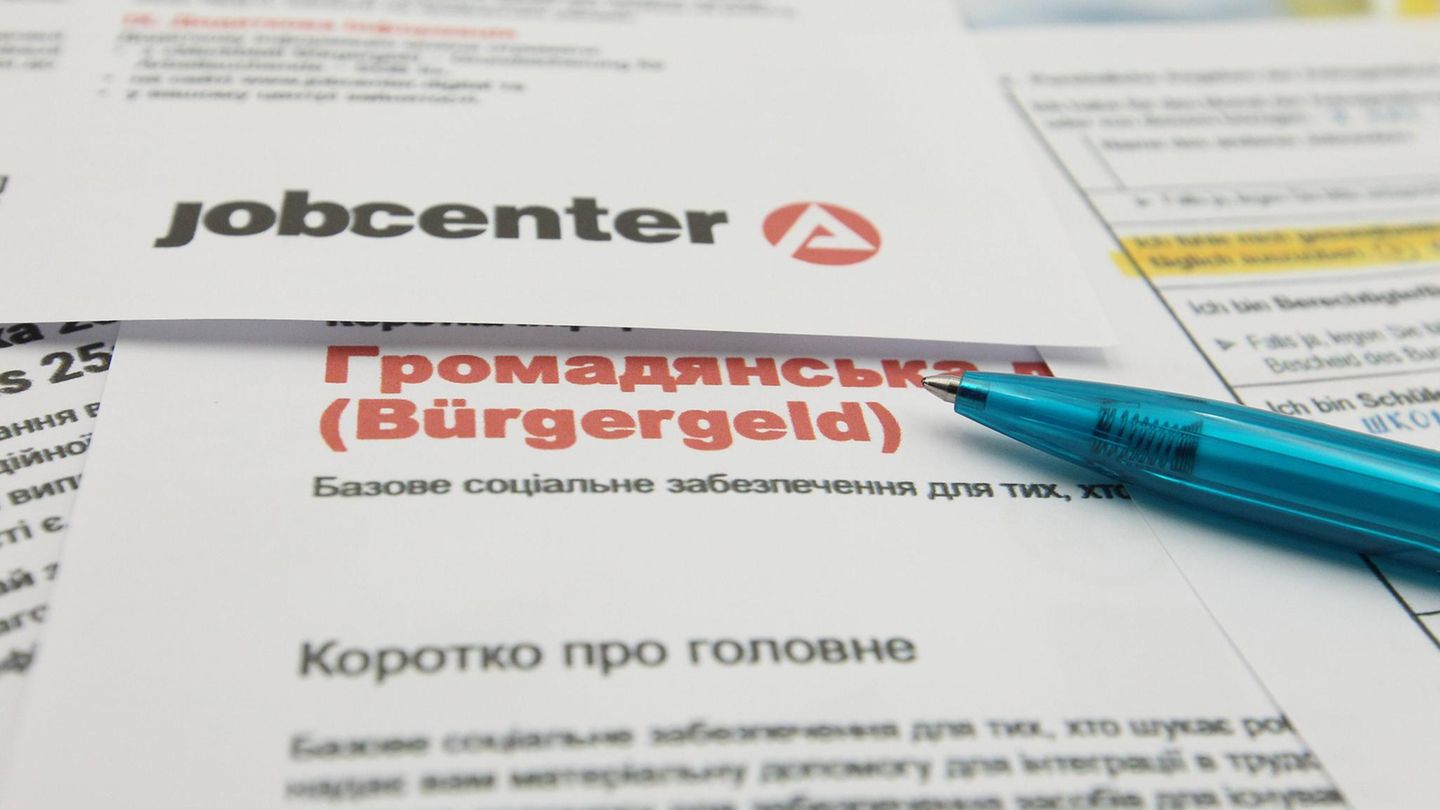Social policy
Does the civil allowance spoil the Ukrainians? This is how it does Europe
Copy the current link
Add to the memorial list
Germany has taken up more than a million Ukrainian refugees. The costs for your citizens’ benefit are fully disputed. Do other countries have better solutions?
Too high social benefits, too little incentive to work: the CDU and CSU criticize the care of Ukrainian war refugees with citizenship. Bavaria’s Prime Minister Markus Söder (CSU) only wants to grant you the lower asylum seeker services in the future. You can get services here “like no other country on earth,” says Chancellor Minister Thorsten Frei (CDU).
Saxon Prime Minister Michael Kretschmer (CDU) draws a comparison to Ukrainians in France, Holland, Poland and the Czech Republic: “Everywhere there is the quota of people who work, much, much higher than ours.” But what is different in these countries? An overview.
Citizens’ allowance in Germany
Germany has received around 1.23 million refugees from there since the Russian major attack on Ukraine in February 2022. According to figures from the Federal Employment Agency, there were a good 693,000 Ukrainian beneficiaries in the citizen benefit in April 2025, and around 497,000 of them were considered to be able to work for at least three hours a day. The civil allowance for single people is 563 euros a month, accommodation and heating are added.
According to BA, around 279,000 Ukrainians were employed in May in May, an increase of almost 80,000 or 40.1 percent compared to the previous year – For almost 363,000, the Federal Agency notes “underemployment” or funding. Since October 2023, a “Jobturbo” for Ukrainians is to accelerate the mediation. Since then, the employment rate has grew from 24.8 to 33.2 percent.
Experts cite an obstacles to employment: language barriers and long waiting times for language courses, slow recognition of Ukrainian professional qualifications and a lack of childcare, because there were particularly many Ukrainian women with children.
Poland
In Poland, the employment rate for Ukrainian refugees is almost twice as high as in Germany. Around 65 percent are employed, as a study by the Polish Economic Institute published in December showed. In Germany’s eastern neighbors, 993,000 Ukrainian citizens live with protection status.
In Poland, Ukrainian refugees are entitled to the equivalent of 180 euros child benefit per child. For the second and another child there is still a childcare allowance of 117 euros a month during the first two years. In addition, the refugees have free access to the education system and health care. With this they are equal to Polish families. Citizens’ money for adults without disabilities that cannot or do not want to find work does not exist in Poland.
The high employment rate is not only explained by the fact that the social benefits are not enough to live. On the one hand, the linguistic barriers are lower than in Germany: Ukrainian spokesman is relatively easy to learn Polish because of the proximity of both languages. In addition, around 1.5 million Ukrainians in Poland were employed before the war started. So there are networks here that refugees can fall back on when looking for work.
Czech Republic
Most of the Ukrainian refugees of all EU countries boasted of the Czech Republic, measured by the population of not quite eleven million. The Interior Ministry in Prague has 581,184 Ukrainians. Similar to Germany, it is more extensive support for Ukrainians with protection status in the Czech Republic than that for asylum seekers.
However, it cannot simply be put into numbers because it is composed of diverse services, including benefits. Social and residential aids are calculated, taking into account their own income and assets, and staggered in such a way that they motivate them to start work. According to information from the CTK news agency, a third of the Ukrainians with protection status were children and over 65-year-olds. Around 60 percent of the others had a job.
Italy
In Italy, after Eurostat data in June 2025, more than 168,000 people from Ukraine were with temporary protection status. Like Italian citizens, they have access to health care, the labor market as well as the education system, study, vocational training and internships.
If you have no accommodation on arrival, you can live in hotels, religious institutions or in the decentralized recording system. Those who live privately received a maintenance subsidy of 300 euros per adult and 150 euros per minute by April 2025, for a maximum of three months. This financial support was only granted if the protection status had been granted by the end of January 2025. No more money has been paid since April – there are only benefits in kind in the form of accommodation.
A report by the Italian Ministry of Labor from 2024 shows that between March 2022 and June 2023, around 174,000 people came from Ukraine to Italy, mostly women and minors.
Netherlands
Around 124,000 Ukrainian refugees live in the Netherlands, most of them in state -funded accommodations. Every Ukrainian is entitled to the so -called “leef money” – A contribution to a living such as food and clothing. On average, an adult gets 315 euros per month. The amount can be lower depending on the age and family size. People don’t get money for food if they are cared for in their accommodation.
As soon as a Ukrainian pursues a paid work, the right to “leef money” for the whole family does not apply. However, like other citizens of the state, the family gets child benefit or with low income, other aid such as housing benefit. Around 60 percent of Ukrainians currently have paid work.
Bulgaria
For refugees from Ukraine, the poorest EU country Bulgaria is more of a transit. Around 60,800 people from Ukraine currently live there from almost 3.4 million Ukrainians who had entered Bulgaria after the war in 2022. You can work and register with the employment offices. According to the Ukrainian embassy in Bulgaria, 14,000 people from Ukraine were in the works in November 2024.
Under certain conditions, the refugees are entitled to a one -off support of the equivalent of up to 806 euros. People from Ukraine can also apply for various social benefits and housing benefit under the same conditions as Bulgarians. Refugees without their own apartment are accommodated and cared for in state -funded accommodations.
Romania
Romania largely builds social benefits for the refugees on whether they work or at least try. Individuals receive the equivalent of around 100 euros per month, families three times as much. After a month, the condition for the help is that affected work or job search is proven and your children register in schools. You get basic medical care like all insured Romanians in the event of illness.
Since the beginning of the war, 11.1 million Ukrainians have crossed the approximately 650 kilometer -long border to Romania. Around 100,000 have stayed in Romania. In all this time, the employment office (as of January 2025) registered 24,057 Ukrainian refugees and conveyed it 3,271 jobs.
Dpa
LPB
Source: Stern
I have been working in the news industry for over 6 years, first as a reporter and now as an editor. I have covered politics extensively, and my work has appeared in major newspapers and online news outlets around the world. In addition to my writing, I also contribute regularly to 24 Hours World.





